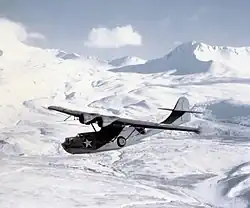 A Consolidated PBY Catalina similar to the accident aircraft | |
| Hijacking | |
|---|---|
| Date | 16 July 1948[1] |
| Summary | Hijacking resulting in crash, robbery |
| Site | Jiuzhou Yang (Pearl River Delta) just northeast of Green Island, Xiangzhou, Zhuhai |
| Aircraft | |
| Aircraft type | Consolidated PBY-5A Catalina |
| Operator | Macau Air Transport Company (Cathay Pacific subsidiary) |
| Registration | VR-HDT |
| Flight origin | Macau |
| Destination | Hong Kong |
| Passengers | 23[2] |
| Crew | 3[2][3] |
| Fatalities | 25 |
| Injuries | 1 |
| Survivors | 1 (lead hijacker) |
| Miss Macao | |||||||||||||||
|---|---|---|---|---|---|---|---|---|---|---|---|---|---|---|---|
| Traditional Chinese | 澳門小姐 | ||||||||||||||
| Simplified Chinese | 澳门小姐 | ||||||||||||||
| |||||||||||||||
Miss Macao (Chinese: 澳門小姐; Sidney Lau: O3 Moon4 Siu2 Je2) was a Catalina seaplane owned by Cathay Pacific and operated by subsidiary Macau Air Transport Company. On 16 July 1948 it was involved in the first hijacking of a commercial aircraft.[2] Piracy for robbery and ransom was the motive.[4][5] The aircraft crashed after the pilot was shot while resisting the attackers, leaving one of the hijackers as the sole survivor of the incident.
The lone survivor, Wong Yu (黃裕; 黄裕; Wong4 Yue6; Huáng Yù), confessed to membership of the gang of four pirates who attempted the hijacking (then simply labelled "piracy"). The hijackers met with fierce resistance during which the pilot was shot, causing the aircraft to crash, but Wong Yu survived by jumping out the emergency exit just before the plane hit the water. The object of the plot was to rob wealthy passengers and hold them for ransom.[6] He was brought to court by the Macau police, but the Macau court suggested that the prosecution should be brought in Hong Kong instead, since the plane was registered in Hong Kong and most of the passengers were from there. However, the British colonial government in Hong Kong stated that the incident happened over Chinese territory in which the British had no jurisdiction. Since no state claimed authority to try him, Wong was released without trial from Macao Central Prison on 11 June 1951, and was then deported to China (by then the People's Republic of China).[1]
See also
- 1933 Imperial Airways Diksmuide crash, the first act of in-flight airline sabotage
- List of sole survivors of airline accidents or incidents
References
- 1 2 Footer, Mark (20 July 2008). "Flight of no return: How a Cathay Pacific plane became the first hijacked commercial airliner". South China Morning Post. Retrieved 15 October 2016.
- 1 2 3 Eather, Charles (1983). Syd's Pirates – A Story of an Airline: Cathay Pacific Airways. Australia: Durnmount. ISBN 978-0-949756-05-3.
- ↑ "Catalina – Aviation's first act of armed piracy". 1 August 2002. Retrieved 15 May 2010.
- ↑ "Flights of fancy Issue 10". 1 November 2008. Archived from the original on 8 August 2014. Retrieved 15 May 2010.
- ↑ "Pilots & Pirates". Time. 9 September 1948. Archived from the original on 30 September 2007. Retrieved 15 May 2010. "Since piracy laws don't yet cover air piracy, he will probably be charged with simple murder."
- ↑ "On This Day: First Commercial Flight Hijacked". 16 July 2010. Archived from the original on 3 January 2012. Retrieved 24 March 2013.